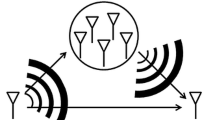Abstract
In this paper, the process of the Nth-best relay selection strategy with outdated feedback is given in the selection cooperative system. The performance of the proposed Nth-best relay selection with outdated channel state information is investigated in Rayleigh fading scenarios. The exact closed-form expression for the outage performance is derived. In the high signal-to-noise ratio regime, the asymptotic outage behavior is also analyzed. In addition, based on the asymptotic analysis, the diversity-multiplexing tradeoff of the considered system is obtained. At last, simulation results show that even a small deviation of the channel estimates from the actual values will lead to a severe degradation of the outage performance of the considered system.






Similar content being viewed by others
References
Sendonaris, A., Erkip, E., & Aazhang, B. (2003). User cooperation diversity. Part I. System description. IEEE Transactions on Communications, 51(11), 1927–1938.
Sendonaris, A., Erkip, E., & Aazhang, B. (2003). User cooperation diversity Part II: Implementation aspects and performance analysis. IEEE Transactions on Communications, 51(11), 1939–1948.
Bletsas, A., Khisti, A., Reed, D. P., & Lippman, A. (2006). A simple cooperative diversity method based on network path selection. IEEE Journal on Selected Areas in Communications, 24(3), 659–672.
Bletsas, A., Shin, H., & Win, M. Z. (2007). Cooperative communications with outage-optimal opportunistic relaying. IEEE Transactions on Wireless Communications, 6(9), 3450–3460.
Wang, H., Yang, S., & Lin, J. (2009). A distributed selection cooperation protocol with feedback and its DMT in Nakagami-m fading channels. IEEE Communications Letters, 13(11), 844–846.
Michalopoulos, D., & Karagiannidis, G. (2008). Performance analysis of single relay selection in Rayleigh fading. IEEE Transactions on Wireless Communications, 7(10), 3718–3724.
Ikki, S. S., & Ahmed, M. H. (2010). On the performance of cooperative-diversity networks with the \(N\)th best-relay selection scheme. IEEE Transactions on Communications, 58(11), 3062–3069.
Salhab, A. M., Al-Qahtani, F., Zummo, S. A., & Alnuweiri, H. (2013). Outage analysis of \(N\)thth-best DF relay systems in the presence of CCI over Rayleigh fading channels. IEEE Communications Letters, 17(4), 697–700.
Zhang, X., Yan, Z., Gao, Y., & Wang, W. (2013). On the study of outage performance for cognitive relay networks (CRN) with the Nth best-relay selection in Rayleigh-fading channels. IEEE Wireless Communications Letters, 2(1), 110–113.
Chu, S. I. (2011). Performance of amplify-and-forward cooperative communications with the \(N\)th best-relay selection scheme over Nakagami-m fading channels. IEEE Communications Letters, 15(2), 172–174.
Jia, X., Yang, L., & Zhu, H. (2014). Performance comparison analyses of the \(N\)th best relay selection schemes over independent and non-identically distributed Nakagami-m fading channels. Wireless Personal Communications, 75(2), 1355–1372.
Olfat, E., & Olfat, A. (2014). Outage performance of hybrid decode-amplify-forward protocol with the nth best relay selection. Wireless Personal Communications, 78(2), 1403–1412.
Jia, X., Zhu, H., Yang, L., & Fu, H. (2013). Performance analyses of the \(N-R\)th dual best relays opportunistic cooperation with amplify-and-forward protocols. Wireless Personal Communications, 71, 2361–2377.
Torabi, M., & Haccoun, D. (2010). Capacity analysis of opportunistic relaying in cooperative systems with outdated channel information. IEEE Communications Letters, 14(12), 1137–1139.
Michalopoulos, Diomidis S., Suraweera, Himal A., Karagiannidis, George K., & Schober, Robert. (2012). Amplify-and-forward relay selection with outdated channel estimates. IEEE Transactions on Communications, 60(5), 1278–1290.
Soysa, M., Suraweera, H. A., Tellambura, C., & Garg, H. K. (2012). Partial and opportunistic relay selection with outdated channel estimates. IEEE Transactions on Communications, 60(3), 840–850.
Wang, C., Deng, K., Li, Y. B., Yin, Q. Y., & Zhuang, L. L. (2014). A simple amplify-and-forward opportunistic relaying based on outdated channel state information. Science China Information Sciences, 57(6), 169–187.
Vicario, J. L., Bel, A., Lopez-Salcedo, Jose A., & Seco, G. (2009). Opportunistic relay selection with outdated CSI: Outage probability and diversity analysis. IEEE Transactions on Wireless Communications, 8(6), 2872–2876.
Li, Y., Yin, Q., Xu, W., & Wang, H. M. (2011). On the design of relay selection strategies in regenerative cooperative networks with outdated CSI. IEEE Transactions on Wireless Communications, 10(9), 3086–3097.
Acknowledgments
The authors would like to thank the editors and the anonymous reviewers for their constructive comments and suggestions, which helped to improve the quality of this paper. This work was supported by Shandong Provincial Natural Science Foundation, China under Grant Nos. ZR2014FQ012 and ZR2014FP003, Qingdao Municipal Applied Basic Research Project of China under Grant No. 15-9-1-111-jch, the Project of Shandong Province Higher Educational Science and Technology Program under Grant No. J14LN25, and the National Science and Technology Pillar Program of China during the 12th Five-Year Plan Period under Grant No. 2014BAK12B06.
Author information
Authors and Affiliations
Corresponding author
Appendices
Appendix 1
In the case of \(0 \le \rho < 1\), satisfying \({\gamma _{{k^*}D}} \ne {\tilde{\gamma } _{{k^*}D}}\). Based on our problem formulation we can write the PDF \({f_{{\gamma _{{k^*}D}}}}\left( x \right)\) as follows
Substituting (8) and \({f_{{\gamma _{SD}}}}\left( x \right) = {{\exp ( - {x /{{{\bar{\gamma } }_{SD}}}})} /{{{\bar{\gamma } }_{SD}}}}\) into (24), after some algebraic manipulations, we can obtain
After some integral manipulations, (11) can be easily obtained from (25).
Appendix 2
In the case of \(0 \le \rho < 1\), satisfying \({\gamma _{{k^*}D}} \ne {\tilde{\gamma } _{{k^*}D}}\). Based on our problem formulation we can write the PDF \({f_{{\gamma _{{k^*}D}}}}\left( x \right)\) as follow
Using the Bayes rule, it is well known that the conditional probability density function can be expressed as
Substituting (27) into (26), the PDF of \({\gamma _{{k^*}D}}\) can be rewritten as
Substituting (4) and (9) into (28), after some simpler manipulations, we can obtain (12).
Appendix 3
In case of \(0 \le \rho < 1\), the term \(P\left\{ {{\gamma _{SD}} + {\gamma _{{k^*}D}} < {g_T}} \right\}\) in (10) can be written as
Substituting (13) and \({f_{{\gamma _{SD}}}}\left( x \right) = {{\exp ( - x /{{\bar{\gamma } }_{SD}}}}\) into (29), after some simple manipulations, we obtain
Rights and permissions
About this article
Cite this article
Li, E., Wang, X., Dong, Y. et al. Research on the Nth-best Relay Selection with Outdated Feedback in Selection Cooperation Systems. Wireless Pers Commun 89, 45–59 (2016). https://doi.org/10.1007/s11277-016-3251-7
Published:
Issue Date:
DOI: https://doi.org/10.1007/s11277-016-3251-7




